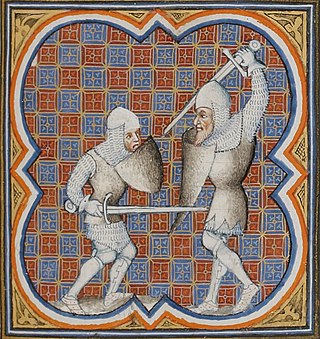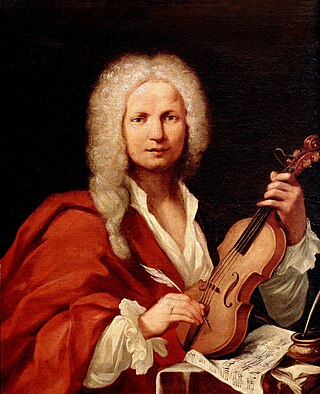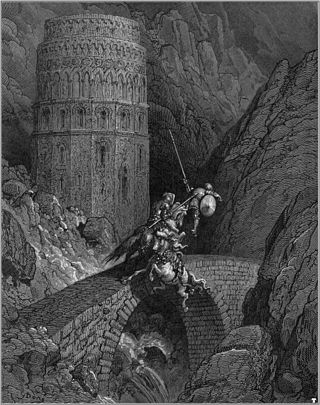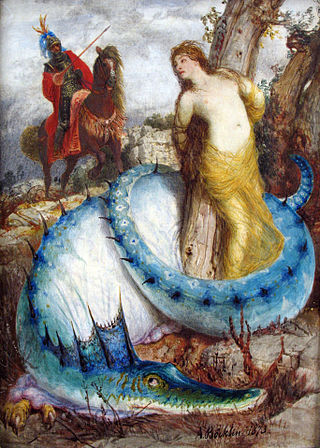Related Research Articles

Ludovico Ariosto was an Italian poet. He is best known as the author of the romance epic Orlando Furioso (1516). The poem, a continuation of Matteo Maria Boiardo's Orlando Innamorato, describes the adventures of Charlemagne, Orlando, and the Franks as they battle against the Saracens with diversions into many sideplots. The poem is transformed into a satire of the chivalric tradition. Ariosto composed the poem in the ottava rima rhyme scheme and introduced narrative commentary throughout the work.

Orlando furioso is an Italian epic poem by Ludovico Ariosto which has exerted a wide influence on later culture. The earliest version appeared in 1516, although the poem was not published in its complete form until 1532. Orlando furioso is a continuation of Matteo Maria Boiardo's unfinished romance Orlando innamorato. In its historical setting and characters, it shares some features with the Old French Chanson de Roland of the eleventh century, which tells of the death of Roland. The story is also a chivalric romance which stemmed from a tradition beginning in the late Middle Ages and continuing in popularity in the 16th century and well into the 17th.

Renaudde Montauban was a legendary hero and knight which appeared in a 12th-century Old French chanson de geste known as The Four Sons of Aymon. The four sons of Duke Aymon are Renaud, Richard, Alard and Guiscard, and their cousin is the magician Maugris. Renaud possesses the magical horse Bayard and the sword Froberge.

Orlando Innamorato is an epic poem written by the Italian Renaissance author Matteo Maria Boiardo. The poem is a romance concerning the heroic knight Orlando (Roland). It was published between 1483 and 1495.

Francesco Berni was an Italian poet. He is credited for beginning what is now known as "Bernesque poetry", a serio-comedic type of poetry with elements of satire.

Jerusalem Delivered, also known as The Liberation of Jerusalem, is an epic poem by the Italian poet Torquato Tasso, first published in 1581, that tells a largely mythified version of the First Crusade in which Christian knights, led by Godfrey of Bouillon, battle Muslims in order to take Jerusalem. Tasso began work on the poem in the mid-1560s. Originally, it bore the title Il Goffredo. It was completed in April, 1575 and that summer the poet read his work to Duke Alfonso of Ferrara and Lucrezia, Duchess of Urbino. A pirate edition of 14 cantos from the poem appeared in Venice in 1580. The first complete editions of Gerusalemme liberata were published in Parma and Ferrara in 1581.

In English literature, Don Juan, written from 1819 to 1824 by the English poet Lord Byron, is a satirical, epic poem which portrays the Spanish folk legend of Don Juan, not as a womaniser as the character is historically portrayed, but as a victim easily seduced by women. As genre literature, Don Juan is an epic poem, written in ottava rima and presented in sixteen cantos. Lord Byron derived the character of Don Juan from traditional Spanish folk legends, however the story was very much his own. Upon publication in 1819, cantos I and II were widely criticized as immoral because Byron had so freely ridiculed the social subjects and public figures of his time. At his death in 1824, Lord Byron had completed sixteen of seventeen cantos, whilst canto XVII remained unfinished.

In the Matter of France, Ganelon is the knight who betrayed Charlemagne's army to the Saracens, leading to the Battle of Roncevaux Pass. His name is said to derive from the Italian word inganno, meaning fraud or deception. He is based upon the historical Wenilo, the archbishop of Sens who betrayed King Charles the Bald in 858.

Ferragut was a character—a Saracen paladin, sometimes depicted as a giant—in texts dealing with the Matter of France, including the Historia Caroli Magni, and Italian epics, such as Orlando Innamorato by Matteo Maria Boiardo and Orlando Furioso by Ludovico Ariosto. In the tales, he was portrayed as physically invulnerable except at his navel/stomach, and was eventually killed by the paladin Roland.

Angelica is a princess in the epic poem Orlando innamorato by Matteo Maria Boiardo. She reappears in the saga's continuation, Orlando furioso by Ludovico Ariosto, and in various later works based on the two original Orlando pieces. The narratives are part of the Matter of France, a cycle of legendary history stories based on the adventures of Charlemagne and his paladins.

Orlando finto pazzo is an opera in three acts composed by Antonio Vivaldi to a libretto by Grazio Braccioli. The plot is based on an episode in Matteo Boiardo's unfinished epic poem Orlando Innamorato. The second of Vivaldi's known operas, Orlando finto pazzo premiered in November 1714 at the Teatro Sant'Angelo in Venice. Vivaldi acted as impresario as well as composer. Apparently the opera did not meet much approval from the audience and was billed only on few dates, just to be replaced, on 1 December, by a reworking of Giovanni Alberto Ristori’s Orlando furioso, an opera that the Vivaldi "impresa" had very successfully staged in 1713.

Rodomonte is a major character in the Italian romantic epic poems Orlando innamorato by Matteo Maria Boiardo and Orlando furioso by Ludovico Ariosto. He is the King of Sarza and Algiers and the leader of the Saracen army which besieges Charlemagne in Paris. He is in love with Doralice, Princess of Granada, but she elopes with his rival Mandricardo. He tries to seduce Isabella but she tricks him into killing her by mistake. In remorse, Rodomonte builds a bridge in her memory and forces all who cross it to pay tribute. When the "naked and mad" Orlando arrives at the bridge, it is Rodomonte, the pagan, who throws him into the river below. They both swim ashore, but Orlando who is naked and is unimpeded by heavy armor gets to the shore first. Finally, Rodomonte appears at the wedding of Bradamante and Ruggiero and accuses Ruggiero of treason for converting to Christianity and abandoning the Saracen cause. The two fight a duel and Rodomonte is killed.

Ruggiero is a leading character in the Italian romantic epics Orlando Innamorato by Matteo Maria Boiardo and Orlando Furioso by Ludovico Ariosto. Ruggiero had originally appeared in the twelfth-century French epic Aspremont, reworked by Andrea da Barberino as the chivalric romance Aspramonte. In Boiardo and Ariosto's works, he is supposed to be the ancestor of Boiardo and Ariosto's patrons, the Este family of Ferrara, and he plays a major role in the two poems.
Brunello is a character in the Italian romantic epics Orlando innamorato by Matteo Maria Boiardo and Orlando furioso by Ludovico Ariosto. Brunello is a dwarf and a cunning thief who works for the Saracen army of King Agramante. He first appears in the second book of Orlando innamorato where Agramante intends to invade Europe and defeat the Emperor Charlemagne. He has been told he has no chance of success unless he has the young warrior Ruggiero on his side, but Ruggiero has been hidden in a secret garden by the wizard Atlante and the only way to reach him is by using the magic ring belonging to Princess Angelica. Brunello undertakes to steal it and sets off for the fortress of Albracca where not only does he manage to snatch the ring but also robs King Sacripante of his horse and the female warrior Marfisa of her sword. Marfisa sets off in pursuit but Brunello evades her and gives the ring to Agramante, who rewards him with a kingdom. The Saracens find Ruggiero at Mount Carena where they see him behind a wall of glass. However, the wall is too steep and slippery to climb, so Brunello suggests they trick Ruggiero out. He gets them to play war games in the plain beneath the mountain. Ruggiero, with his inherent love of combat, cannot resist and in spite of Atlante's pleas he leaves the garden and begs Brunello for his horse and armour. Brunello only agrees if he will join their expedition against France, to which Ruggiero happily consents.
Sacripante is a character in the Italian romantic epics Orlando innamorato by Matteo Maria Boiardo and Orlando furioso by Ludovico Ariosto. Sacripante is the King of Circassia and one of the leading Saracen knights. He is passionately in love with Angelica and fights to defend her when she is besieged in the fortress of Albracca. His horse Frontino is stolen from underneath him by the cunning thief Brunello. In Orlando furioso he offers to become the wandering Angelica's protector but she evades him.
Albracca is a major city of Cathay in the Italian romantic epics Orlando innamorato by Matteo Maria Boiardo and Orlando furioso by Ludovico Ariosto. In the story it is the walled city and fortress where Angelica and the knights she has befriended make their stand when attacked by Agrican, emperor of Tartary.
La Spagna, also called La Spagna in rima, is a 14th-century Italian epic attributed to the Florentine Sostegno di Zanobi and likely composed between 1350 and 1360. The poem is in ottava rima, composed of 40 cantos, each of about 40 octaves. The work is an adaptation of the story of Charlemagne's battles in Spain and the adventures of his nephew, the paladin Orlando (Roland), including the tale of his mortal duel with Ferraguto and his ultimate death at Roncesvalles.

Angelica and the Hermit is a 1626–1628 painting by Peter Paul Rubens. It shows an episode from canto 8 of Ludovico Ariosto's poem Orlando Furioso. It is now in the Kunsthistorisches Museum in Vienna.

Roger Freeing Angelica is an oil painting by Swiss symbolist painter Arnold Böcklin, from 1873. The painting illustrates a scene from Ariosto's epic Orlando Furioso, in which the Muslim knight Roger saves the pagan princess Angelica from a sea monster. The motif is closely related to the mythological theme of Perseus saving Andromeda.

Mandricardo is a character from the Matter of France, featured in the Italian romantic epic poems Orlando innamorato by Matteo Maria Boiardo and Orlando furioso by Ludovico Ariosto.